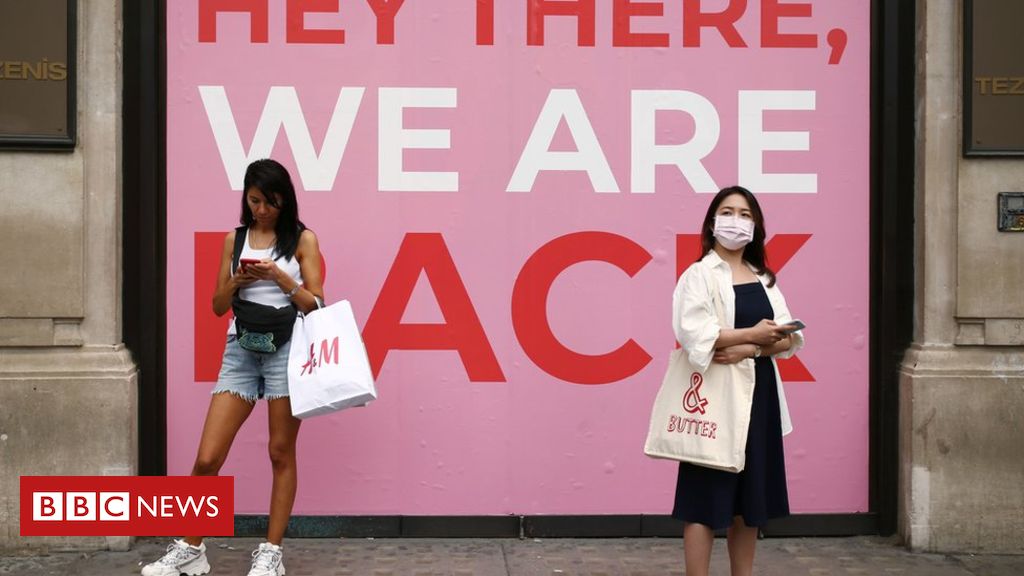Economy
Coronavirus: Bank pumps £100bn into UK economy to aid recovery – BBC News

The Bank of England will pump an extra £100bn into the UK economy to help fight the “unprecedented” coronavirus-induced downturn.
Bank policymakers voted 8-1 to increase the size of its bond-buying programme.
However, they said there was growing evidence that the hit to the economy would be “less severe” than initially feared.
The Bank’s Monetary Policy Committee (MPC) also kept interest rates at a record low of 0.1%.
The move comes just days after Bank governor Andrew Bailey said policymakers were ready to take action after the economy suffered its biggest monthly contraction on record.
The UK economy shrank by 20.4% in April, while official jobs data showed the number of workers on UK payrolls fell by more than 600,000 between March and May.
The Bank said more recent indicators suggested the economy was starting to bounce back.
Minutes from the MPC’s June meeting said: “Payments data are consistent with a recovery in consumer spending in May and June, and housing activity has started to pick up recently.”
However, it warned that the outlook for the economy remained uncertain.
The minutes added: “While recent demand and output data had not been quite as negative as expected, other indicators suggested greater risks around the potential for longer-lasting damage to the economy from the pandemic.”
Back in May, policymakers warned the economy was heading for its sharpest recession on record.
Scenarios drawn up by the Bank suggested the economy could shrink by 25% in the three months to June.
However, the MPC said more recent evidence suggested the contraction would be less severe.
The extra monetary stimulus – known as quantitative easing (QE) – will raise the size of the Bank’s asset purchase programme to £745bn.
Policymakers said the injection would help to support financial markets and underpin the recovery.
However, Andy Haldane, the Bank’s chief economist, voted against the increase.
He said the recovery was happening “sooner and materially faster” than the Bank expected in May.
Slow recovery
Policymakers said the jobs market was likely to remain weak for some time, with a risk of “higher and more persistent unemployment”.
Millions of workers have already seen their pay packets shrink as a result of lower pay for furloughed employees. A survey by the Bank said other companies had postponed or cancelled pay rises this year.
Mr Bailey said: “Even with the relaxation of some Covid-related restrictions on economic activity, a degree of precautionary behaviour by households and businesses is likely to persist. The economy, and especially the labour market, will therefore take some time to recover towards its previous path.”
Weak inflation
Mr Bailey also addressed the recent fall in UK inflation in an open letter to Chancellor Rishi Sunak.
Inflation, as measured by the consumer prices index (CPI), fell to 0.5% in May, from 0.8% in April – well below the Bank of England’s 2% target.
Mr Bailey said weak inflation had been by driven by falling oil and energy prices, as well as a global drop in economic activity.
The Bank expects inflation to return to target within two years.
The Bank of England has increased its support for the economy, despite it assessing that the outlook is not quite as awful as its scenario last month. The economy is on course for a hit in the second quarter of about 20% compared with the final three months of 2019. That’s still historic, and off the scale, but not quite as extreme as the 27% it predicted in May.
The extra £100bn of purchases of government bonds also has the air of an insurance policy.
Most of the MPC were concerned about a couple of factors, A less awful outlook does not mean the recovery will be quick. This is for two reasons stretching beyond economics.
There is a fear that the “prevalence of the virus” in the UK will mean that Britons will continue to socially distance, voluntarily, holding back the recovery more than other nations (Germany would be an example).
Related to that was the idea that more QE now could mitigate the economic impact of “higher rates of Covid-19 infection going forward” – a second wave.
So the news is still bad, but less awful. But risks beyond the purely economic led to more billions being injected into the economy.
Economy
China Wants Everyone to Trade In Their Old Cars, Fridges to Help Save Its Economy – Bloomberg


China’s world-beating electric vehicle industry, at the heart of growing trade tensions with the US and Europe, is set to receive a big boost from the government’s latest effort to accelerate growth.
That’s one takeaway from what Beijing has revealed about its plan for incentives that will encourage Chinese businesses and households to adopt cleaner technologies. It’s widely expected to be one of this year’s main stimulus programs, though question-marks remain — including how much the government will spend.
Economy
German Business Outlook Hits One-Year High as Economy Heals – BNN Bloomberg


(Bloomberg) — German business sentiment improved to its highest level in a year — reinforcing recent signs that Europe’s largest economy is exiting two years of struggles.
An expectations gauge by the Ifo institute rose to 89.9. in April from a revised 87.7 the previous month. That exceeds the 88.9 median forecast in a Bloomberg survey. A measure of current conditions also advanced.
“Sentiment has improved at companies in Germany,” Ifo President Clemens Fuest said. “Companies were more satisfied with their current business. Their expectations also brightened. The economy is stabilizing, especially thanks to service providers.”
A stronger global economy and the prospect of looser monetary policy in the euro zone are helping drag Germany out of the malaise that set in following Russia’s attack on Ukraine. European Central Bank President Christine Lagarde said last week that the country may have “turned the corner,” while Chancellor Olaf Scholz has also expressed optimism, citing record employment and retreating inflation.
There’s been a particular shift in the data in recent weeks, with the Bundesbank now estimating that output rose in the first quarter, having only a month ago foreseen a contraction that would have ushered in a first recession since the pandemic.
Even so, the start of the year “didn’t go great,” according to Fuest.
“What we’re seeing at the moment confirms the forecasts, which are saying that growth will be weak in Germany, but at least it won’t be negative,” he told Bloomberg Television. “So this is the stabilization we expected. It’s not a complete recovery. But at least it’s a start.”
Monthly purchasing managers’ surveys for April brought more cheer this week as Germany returned to expansion for the first time since June 2023. Weak spots remain, however — notably in industry, which is still mired in a slump that’s being offset by a surge in services activity.
“We see an improving worldwide economy,” Fuest said. “But this doesn’t seem to reach German manufacturing, which is puzzling in a way.”
Germany, which was the only Group of Seven economy to shrink last year and has been weighing on the wider region, helped private-sector output in the 20-nation euro area strengthen this month, S&P Global said.
–With assistance from Joel Rinneby, Kristian Siedenburg and Francine Lacqua.
(Updates with more comments from Fuest starting in sixth paragraph.)
©2024 Bloomberg L.P.
Economy
Parallel economy: How Russia is defying the West’s boycott
|
|


When Moscow resident Zoya, 62, was planning a trip to Italy to visit her daughter last August, she saw the perfect opportunity to buy the Apple Watch she had long dreamed of owning.
Officially, Apple does not sell its products in Russia.
The California-based tech giant was one of the first companies to announce it would exit the country in response to Russian President Vladimir Putin’s full-scale invasion of Ukraine on February 24, 2022.
But the week before her trip, Zoya made a surprise discovery while browsing Yandex.Market, one of several Russian answers to Amazon, where she regularly shops.
Not only was the Apple Watch available for sale on the website, it was cheaper than in Italy.
Zoya bought the watch without a moment’s delay.
The serial code on the watch that was delivered to her home confirmed that it was manufactured by Apple in 2022 and intended for sale in the United States.
“In the store, they explained to me that these are genuine Apple products entering Russia through parallel imports,” Zoya, who asked to be only referred to by her first name, told Al Jazeera.
“I thought it was much easier to buy online than searching for a store in an unfamiliar country.”
Nearly 1,400 companies, including many of the most internationally recognisable brands, have since February 2022 announced that they would cease or dial back their operations in Russia in protest of Moscow’s military aggression against Ukraine.
But two years after the invasion, many of these companies’ products are still widely sold in Russia, in many cases in violation of Western-led sanctions, a months-long investigation by Al Jazeera has found.
Aided by the Russian government’s legalisation of parallel imports, Russian businesses have established a network of alternative supply chains to import restricted goods through third countries.
The companies that make the products have been either unwilling or unable to clamp down on these unofficial distribution networks.





-



 Health14 hours ago
Health14 hours agoRemnants of bird flu virus found in pasteurized milk, FDA says
-
Art20 hours ago
Mayor's youth advisory council seeks submissions for art gala – SooToday
-



 Health18 hours ago
Health18 hours agoBird flu virus found in grocery milk as officials say supply still safe
-



 Investment19 hours ago
Investment19 hours agoTaxes should not wag the tail of the investment dog, but that’s what Trudeau wants
-



 Science23 hours ago
Science23 hours agoiN PHOTOS: Nature lovers celebrate flora, fauna for Earth Day in Kamloops, Okanagan | iNFOnews | Thompson-Okanagan's News Source – iNFOnews
-
News19 hours ago
Peel police chief met Sri Lankan officer a court says ‘participated’ in torture – Global News
-
Media14 hours ago
Vaughn Palmer: B.C. premier gives social media giants another chance
-
Art20 hours ago
An exhibition with a cause: Montreal's 'Art by the Water' celebrates 15 years – CityNews Montreal




